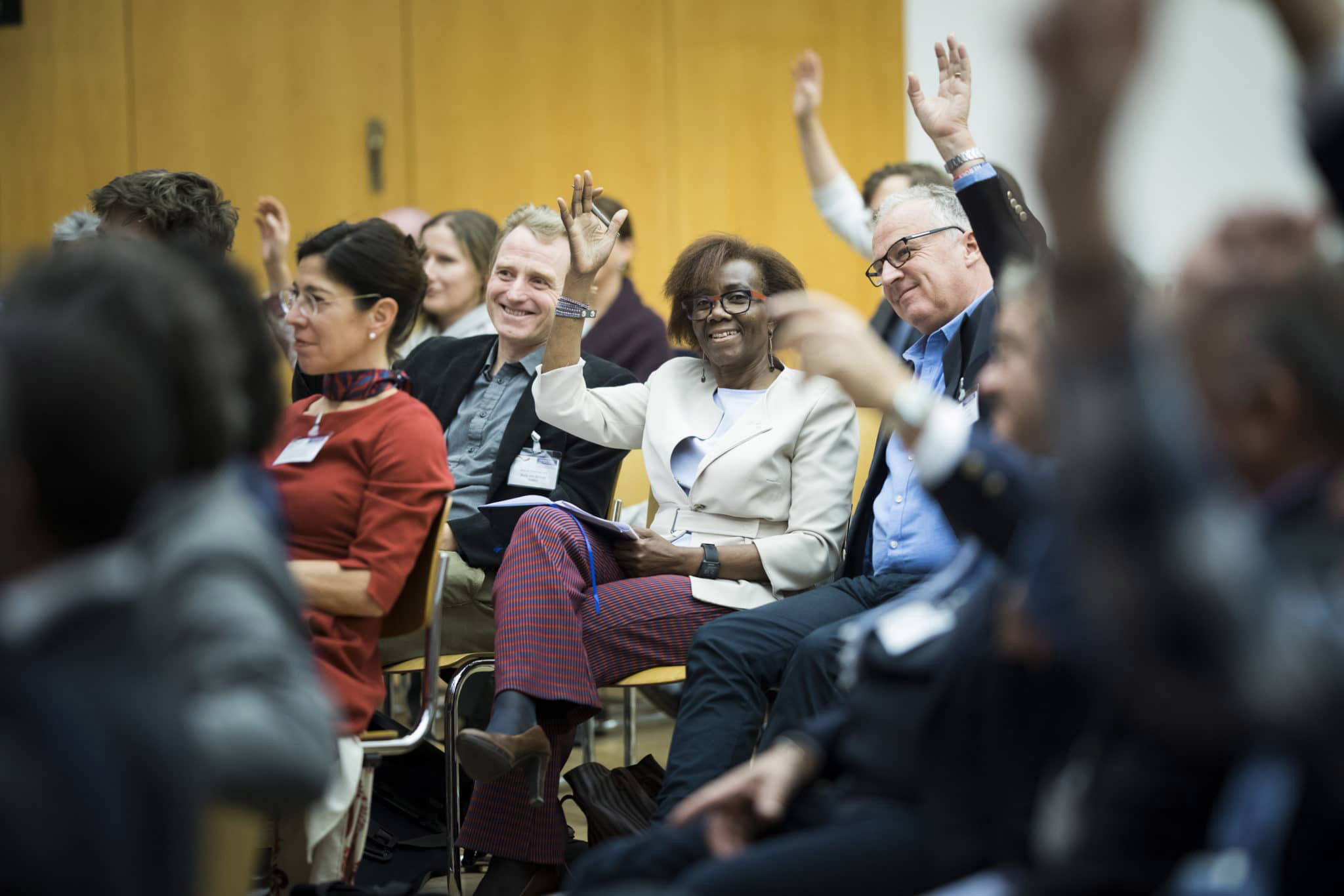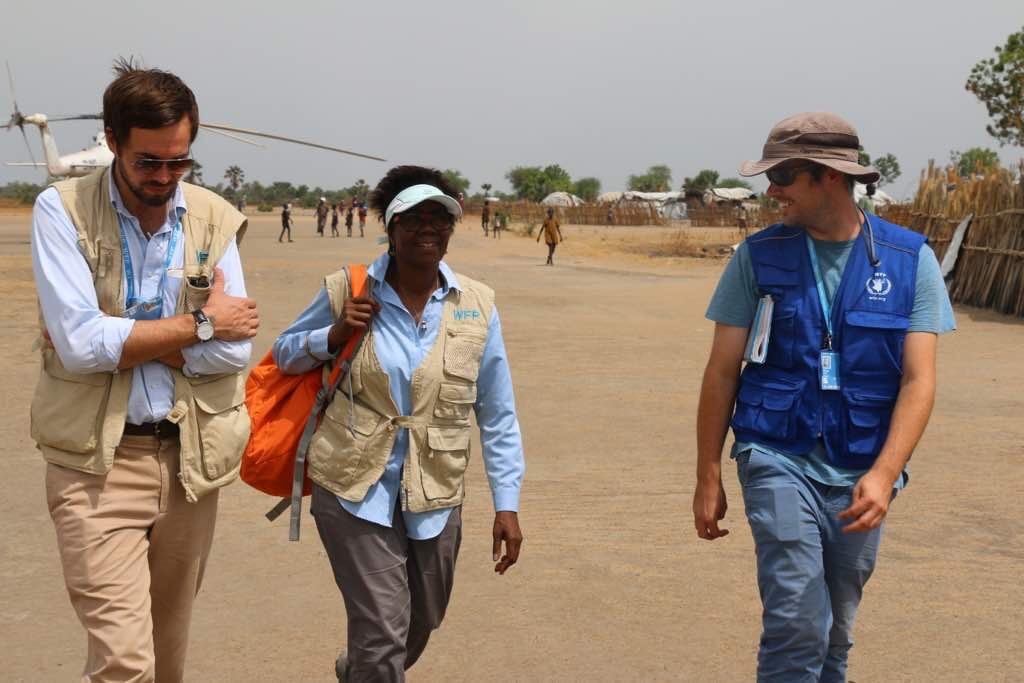
Joyce Kanyangwa Luma, WFP Director of Human Resources attended the CCHN’s 2019 Annual Meeting/Berlin Conference in Germany. (Photo: Photothek)
Our conversations with female leaders for the Legitimacy, Diversity and Women in Frontline Negotiations Project continued with Joyce Kanyangwa Luma, the Director of Human Resources for the World Food Programme (WFP). Joyce reflected on her experience in emergency operations and highlighted the importance of diversity in the negotiating team and how gender, nationality, languages and culture can be leveraged in negotiations. She also underscored the need to give female negotiators more recognition and more chances to gain experience in the most complex operational contexts.
With her academic background in agricultural science and nutrition, it’s no surprise that Joyce Kanyangwa Luma ended up specializing in food security, using her expertise to analyse and implement food-related projects. And thanks to the WFP’s staff rotation system, she’s been able to work in different disciplines and better understand different aspects of WFP’s work.
Be prepared and get the first-hand experience
Before joining WFP, Joyce worked in her home country, Zambia. On one project, she was hired by the FAO (Food and Agriculture Organization) to monitor the impact of drought on people and suggest appropriate response options. She used her analytical background to understand where the most vulnerable people were, how her teams could reach them, and what kind of assistance to give them. The negotiation came in once all those aspects were figured out, to ensure that the aid reached those who were most vulnerable.
WFP, a user of the analysis and report Joyce produced on the drought, quickly recognized her skill sets and offered her a job. Joyce has had an interesting career with WFP which ranges from the field in Pakistan, South Africa, South Sudan, Ethiopia to key positions in Headquarters. Joyce acknowledges that from all her experiences, South Sudan was really the introduction to the frontlines.
Before going to South Sudan, Joyce took a course on negotiating. Even though the course was more business-related, she still learned how to think through the difficulties of negotiating and to be prepared for the circumstances. In South Sudan, the major challenges were the fighting and the fact that people were actively trying to prevent her team from getting access. She had to understand the dynamics of the conflict and negotiate with the groups in charge in the areas she was trying to reach. She saw first-hand the importance of having a support team who was very familiar with the key groups.
Asked what her advice would be for other young humanitarians, Joyce said, “I encourage most women I talk to in the organization to go to the frontline. It is the place where you learn. You do not learn to be a humanitarian at the headquarters. It is really by going to the deepest field where you understand the issues at stake and what needs to be done to reach the most vulnerable people. For instance, South Sudan is really the Harvard for humanitarians. If you want to be a real humanitarian, go to the field! Humanitarian work is about problem-solving and dealing with human issues, you do not learn that from a textbook.”

Joyce Kanyangwa Luma when doing a field mission. (Photo: Joyce Kanyangwa Luma)
Encourage and empower female negotiators
When working and negotiating in the field, Joyce says there are some advantages to being female and being from a developing country. In Pakistan, she was surprised that the local people saw her as one of them because she too came from a developing country. She got along well with local counterparts because they did not see her as having a Western agenda. She could earn trust by making it clear that her intentions were about the general welfare of the people, not politics
For her, being an African woman almost always made it much easier for her to be accepted in South Sudan. She could navigate better when negotiating with people at all levels and in different contexts. She remembered one time she said to one of her South Sudanese counterparts, “I’m one of you! I want your country to do well. You have to think about the people who are suffering, not which party you’re supporting”. She says she was just being honest; she thinks that’s why women can reach breakthroughs in some difficult conversations because women are seen as more concerned about the vulnerable people on the ground than anything else.
Recently, she has seen more women applying for jobs in South Sudan and other difficult operations, for senior positions like country directors as well as junior positions. She thinks that people no longer perceive high-risk and emergency operations as being mostly dominated by men. But she stresses that there need to be more discussions between women to encourage and empower them to go to the field.
“At the frontlines we always had female negotiators – we just never recognized them as such. Personally, I think it is about time that we start speaking with female negotiators in the field and harness their experiences because I truly think we can learn a lot from them. The strength of female negotiators is that they can negotiate with the most difficult counterpart without being perceived as threatening. In fact, we should consider assigning more strong and experienced female negotiators to the most difficult operational contexts,” emphasized her.
